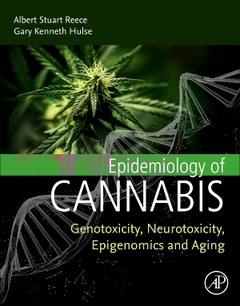Description
Epidemiology of Cannabis
Genotoxicity, Neurotoxicity, Epigenomics and Aging
Authors: Reece Albert Stuart, Hulse Gary Kenneth
Language: English
Subject for Epidemiology of Cannabis:
Approximative price 209.76 €
In Print (Delivery period: 14 days).
Add to cart1150 p. · 21.4x27.6 cm · Paperback
Description
/li>Contents
/li>Biography
/li>Comment
/li>
With all this information gathered into one book in an easily readable form, this book is a reference for clinicians, health science and allied health practitioners, public health and basic science researchers and drug and health regulators interested in these topics. It is also suitable for inclusion in course work and study preparation courses at both the undergraduate and postgraduate levels.
SECTION 1: Mental Illness Close Parallels between Cannabis Use and Deteriorating US Mental Health at Four Levels Supports and Extends the Epidemiological Salience of Demonstrated Causal Mental Health Relationships: A Geospatiotemporal Study 1. National Trends 2. Regional Trends 3. State Trends 4. Sub-State Trends 5. Geospatial Analysis 6. Causality Criteria SECTION 2: Autistic Spectrum Disorder Linked Rise of Cannabis Use and Autism Incidence Demonstrated by Close Three Level Geospatiotemporal Relationships, USA, 1990-2011. 7. National Trends 8. Regional Trends 9. State Trends 10. Geospatial Analysis 11. Changes in State Trends 12. Legal Status and Autism 13. Geospatial Analysis of Legal Status and Autism SECTION 3: Congenital Anomalies Geotemporospatial Analysis of United States 38-44 Congenital Anomalies as a Function of Multiple Cannabinoid- and Substance- Exposure in the Decades of Cannabis Legalization: Phenocopying Thalidomide and Hundred Megabase-Scale Genotoxicity 14. Drug Use by Race 15. Drugs and Defects Overview 16. Chromosomal Anomalies: Anomalies 1:5 17. Gastroschisis: Anomaly 6 18. Atrial Septal Defect (Secundum): Anomaly 7 19. Cardiovascular Defects of Interest: Anomalies 8-11 20. Hawaiian - American Review: Anomalies 12-37 21. Conclusion: Time Course, Quintile Analysis, Canada, Thalidomide, Legal Status, Causality SECTION 4: Cancer and Heritable Cancer Reflections of Heritable Cannabis-Related Genotoxicity in Rising Adult and Pediatric Cancer Rates Across USA in Time- and Ethnicity- Denominated Analyses 22. General Introduction and Overview 23. Sequential Analysis of Cancer Types 24. Geospatiotemporal Modelling - Fitted Values 25. Geospatiotemporal Modelling - Matrix Multiplication 26. Summary of Geospatiotemporal Modelling 27. Overall Conclusions SECTION 5: Epigenetics and Aging As modern epigenetic studies provide profound insights into the observed pattern of teratological, cancerogenic and age-accelerated disease it becomes important to consider new findings in detail. 28. Epigenetics of Cannabinoids - Introduction 29. Epigenetics of Cannabinoids – Historical Studies 30. Epigenetics of Cannabinoids – Longitudinal Sperm Study - Overview 31. Epigenetics of Cannabinoids – Longitudinal Sperm Study – Stem Cells 32. Epigenetics of Cannabinoids – Longitudinal Sperm Study - Chromosomes 33. Epigenetics of Cannabinoids – Longitudinal Sperm Teratology - Brain 34. Epigenetics of Cannabinoids – Longitudinal Sperm Teratology - Cardiovasculature 35. Epigenetics of Cannabinoids – Longitudinal Sperm Teratology – Other Organs 36. Epigenetics of Cannabinoids – Longitudinal Sperm Study - Carcinogenesis 37. Epigenetics of Cannabinoids – Accelerated Aging
Professor Gary Hulse has worked in the area of problem alcohol and drug use for the past 30 years, For the past fourteen years he has held an academic appointment as ‘Coordinator of Alcohol and Drug Education and Training’ within the Faculty of Medicine, University of Western Australia, based at Sir Charles Gairdner Hospital Perth. Research and clinical activities have been primarily directed at developing evidence- based information which will enhance clinical practice. Between 1992-2009, Professor Hulse chaired the Committee on Alcohol and Drug Education in Medical Schools on behalf of the Committee of Deans Australian and New Zealand Medical Schools. Professor Hulse has published in excess of 150 peer review publications. He is Chief Editor of two evidence based clinical alcohol and drug texts published by Oxford University Press which have been adopted as the standard text for medical training by the Australian Medical Schools [Committee of Deans].
- Examines adult and pediatric neurotoxicity and genotoxicity from cannabis use, along with health impacts
- Analyzes epigenetics and the observed pattern of teratological, cancerogenic, and age-accelerated disease
- Utilizes advanced statistical and geotemporalspatial analysis to investigate cannabis exposure and health

